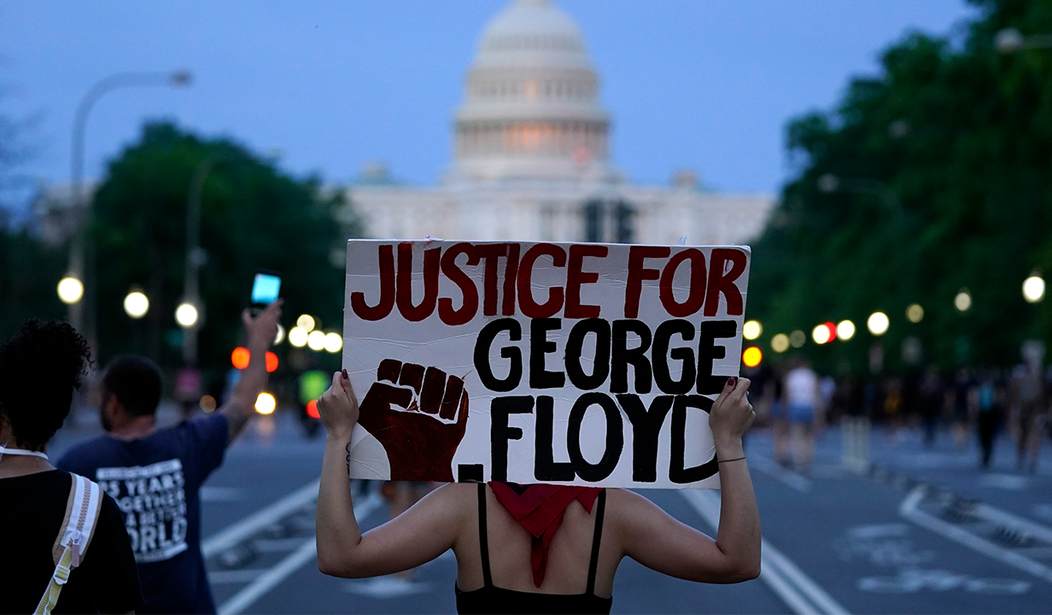On Thursday, a "guilty" verdict was returned for all three ex-officers that were on scene when another ex-officer, Derek Chauvin, kneeled on George Floyd's neck for more than nine minutes in May 2020. Chauvin was found "guilty" last April of all charges, including second-degree unintentional murder, third-degree murder, and second-degree manslaughter in the death of Floyd.
The ex-officers were Tou Thao, 36; J. Alexander Kueng, 28; and Thomas Lane, 38. According to live updates from The New York Times, were found guilty by a federal jury that determined the officers willfully violated Floyd's constitutional rights by not providing him with medical care when he lost a pulse. Jurors had deliberated for about 13 hours.
About their actions and their charges, the live updates explain:
Mr. Thao, a veteran officer who was Mr. Chauvin’s partner, kept a crowd of bystanders at bay while Mr. Lane and Mr. Kueng, both rookies, struggled to arrest Mr. Floyd after a convenience store clerk said he had used a fake $20 bill to buy cigarettes.
All three officers, who along with Mr. Chauvin were fired a day after the killing, were charged with one count of failing to provide medical aid. Mr. Kueng and Mr. Thao were also charged with failing to intervene and stop Mr. Chauvin’s use of force; Mr. Lane, who twice asked Mr. Chauvin if they should roll Mr. Floyd on his side so he could more easily breathe, did not face that charge.
...
Unlike Mr. Chauvin, who did not testify at his trial, each of the three officers took the stand in his own defense and all said that they believed Mr. Chauvin, as the senior officer, was in charge and knew what he was doing. They also said they did not recognize that Mr. Floyd was in the throes of a medical emergency.
“I think I would trust a 19-year veteran to figure it out,” Mr. Thao said. Mr. Kueng, who had Mr. Chauvin as one of his field training officers, said, “He was my senior officer, and I trusted his advice.”
Recommended
The three men are able to remain free on bond while they await sentencing, which has not yet been scheduled.
The New York Times also highlighted the unique nature of these charges:
The case was an extraordinarily rare example of the Justice Department prosecuting officers for their inaction while another officer used excessive force. The verdicts signal to police departments across America that juries may become more willing to convict not just officers who kill people on the job, but also those who watch them do it.
...
Legal experts and racial justice activists had been closely watching the case, saying it could have more ramifications for policing than even Mr. Chauvin’s murder convictions. At the heart of this case was a more widespread problem, experts say, than a single officer’s act of violence: the tendency of officers to stand by when they witness a fellow officer committing a crime.
The jurors’ decision, which came after about 13 hours of deliberations and following a monthlong trial, suggested that they agreed with the prosecution’s arguments that the officers knew in the moment that Mr. Floyd was in severe medical distress and that Mr. Chauvin was breaking the law. The verdict was also a rejection of the argument that was cited in each of the three defense cases: that the officers trusted Mr. Chauvin, the senior officer on the scene, and therefore were not aware that what he was doing was illegal.
This case is believed to be the first time the federal government has charged police officers for failing to intervene against a more senior officer who was using excessive force, according to Christy E. Lopez, a professor at Georgetown University Law Center. Ms. Lopez studied the case law on the subject with a team of researchers and could not find a similar prosecution. She has worked with police departments on training officers about their constitutional duties to step in when they see colleagues breaking the law.
She said the guilty verdicts could significantly change law enforcement culture, compelling agencies to make sure that officers are properly trained and are upholding their duties.
“It forces you to move beyond the bad apple narrative,” Ms. Lopez said. She added, “Now you’re like, ‘Oh, everyone on the scene played a role in this.’ It shifts the entire narrative from misconduct being about just acts of commission to misconduct also being about acts of omission.”
The judge in the case, Judge Paul A. Magnuson could sentence the three ex-officers to anywhere between one year and life in prison.
Chauvin was sentenced last June to 22.5 years in prison for Floyd's death. He also pled guilty last December when it comes to federal charges for violating Floyd's civil rights.

























Join the conversation as a VIP Member